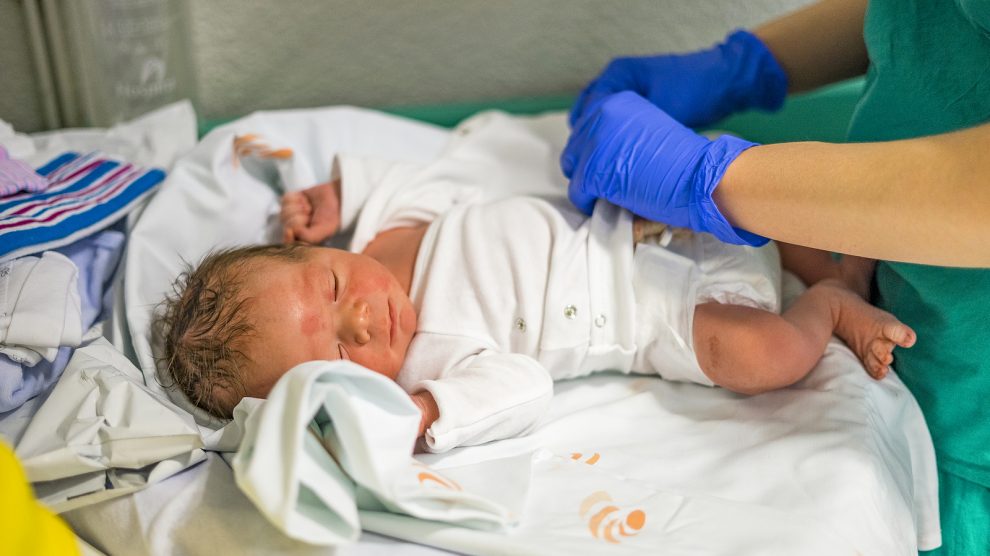Ukraine has emerged as a key player in a niche but growing global market – commercial surrogacy. While the procedure has been of enormous financial benefit to many, critics question if companies in the surrogacy business can ever be ethical – commonly referring to them as Ukraine’s “baby factories”.
Very few countries in the world allow commercial surrogacy, almost all of them in the former Soviet Union: Belarus, Georgia, Kazakhstan, Russia, Ukraine, as well as several US states.
- Czechia’s illegally sterilised Roma women likely to get compensation
- Serbia trails most of Europe on organ donation; a new court ruling will not help
- Not using AI in healthcare will soon be malpractice
While all of these locations have been successful in attracting what are termed ‘reproductive tourists’ from places where surrogacy is much more difficult – or outright illegal, by far the most popular destination is Ukraine.
While there are no official figures for the number of surrogate pregnancies, one estimate suggests that the for-profit surrogacy businesses in Ukraine was responsible for 2,500 births in 2018 alone.
The average price of a surrogate pregnancy in Ukraine is said to be between 25,000 and 70,000 euros, making surrogacy a highly profitable business for those involved.
Babies left stranded
In May 2020, images from the Kyiv-based surrogacy clinic BioTexCom made headlines worldwide when 100 babies were left stranded after Ukraine closed its borders to foreign travellers – including the would-be parents – in order to prevent the spread of Covid-19.
At BioTexCom, which is also said to have facilitated close to half of the surrogate pregnancies in the country, the base cost of the procedure is 39,900 euros.
For “two attempts at baby sex selection” the price rises to 49,900 euros, while for “unlimited attempts” the cost is 64,900 euros, according to a price list on BioTexCom’s official website.
BioTexCom’s owner, Albert Tochilovsky, says that surrogates receive more than half a million hryvnias (15,387 euros) for going through with their pregnancy.
This, argued Tochilovsky in a November 2019 interview also published on the company website, is a “highly paid job” for “women from small villages without husbands, [otherwise] exploited for 2,000 hryvnia (61 euros) a month”.
The relatively affordable prices – when compared with the cost of a surrogate pregnancy in the United States, which runs to hundreds of thousands of US dollars – alongside BioTexCom’s promise of “no absolute infertility”, has made it incredibly popular overseas, and the firm now offers customer service in English, Chinese, French, German, Hebrew, Italian, Korean and Romanian, amongst others.
Unregulated market
However, according to Sergii Antonov, a Kyiv-based lawyer specialising in the reproductive field, companies such as BioTexCom, and 50 others like it, do not represent the true proliferation of the surrogacy business.
“Commercial surrogacy Ukraine is unregulated, and two-thirds of the industry operates illegally,” he says.
Evidence of this is easy to find on Facebook, where alongside the seemingly official pages of registered surrogacy businesses there are number of independent groups, where offers for prospective surrogates are posted on a weekly basis by random users.
One post from the June 20 reads:
“Urgent programme! We are looking for a mother to carry twins!!! The embryos are ready!
No older than 35 years. Terms of payment: reward for the program – 14,000 euros; monthly – 300 euros; for clothes – 300 euros; embryo transfer – 300 euros.
Risks and compensations:
– if a cesarean section is needed – 1,000 euros
– if abortion is needed – 80 euros for each week of pregnancy
– loss of tubes- 1,500 euros
– loss of the uterus – 3,000 euros
– waiting for the program due to the fault of the parents – 100 euros / month, starting from 90 days from the date of signing
-surgical intervention – 300 euros
Message me on Viber if interested”
‘An online baby store’
Ukraine’s Presidential Commissioner for Children’s Rights Mykola Kuleba suggested in 2020 placing a ban on this type of surrogacy, arguing that, “commercialisation and permission to receive such a ‘service’ in Ukraine promotes the uncontrolled sale of Ukrainian children abroad.”
“The birth of a child far from the mother is unnatural. In this way, Ukraine simply becomes an international online store for babies. And we don’t know the real number of such children that Ukraine ‘supplies’ in this way,” he added.
According to Ukrainian law, clients of the procedure must be a married, heterosexual couple in which the wife has a medical condition affecting the uterus, preventing her from carrying a child.
In many cases, the procedure involves only the genetic material of the clients, and thus surrogates have no genetic link to the child. However, the sale and use of the eggs of local women when needed appears to be a common practice.
While limited, several studies have suggested that surrogacy can lead to long-term physical and mental impact on surrogate mothers in particular.
Some estimates suggest that the global commercial surrogacy market is now worth five billion euros. India, Thailand, and Nepal closed their doors to foreigners seeking to pay for a surrogate in 2018 after a series of accusations of human rights violations.
Since then the Ukrainian surrogacy business has boomed: it is now said to represent over a quarter of the global market.
Unlike many news and information platforms, Emerging Europe is free to read, and always will be. There is no paywall here. We are independent, not affiliated with nor representing any political party or business organisation. We want the very best for emerging Europe, nothing more, nothing less. Your support will help us continue to spread the word about this amazing region.
You can contribute here. Thank you.








Add Comment